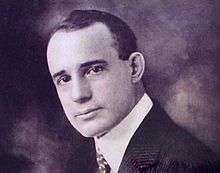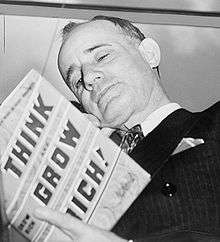Napoleon Hill
| Napoleon Hill | |
|---|---|
 Portrait Napoleon Hill4 | |
| Born |
October 26, 1883 Pound, Virginia |
| Died |
November 8, 1970 (aged 87) South Carolina |
| Occupation | Author, Journalist, Salesman, Lecturer |
| Citizenship | American |
| Period | 1928–1971 |
| Genre | Non-fiction, Self-help |
| Subject | personal development, how-to, self-help, motivational, sales, finance, investment |
| Literary movement | Self-help, Law of attraction (New Thought), New Thought |
| Notable works |
Think and Grow Rich The Law of Success Success Through a Positive Mental Attitude Outwitting the Devil |
|
| |
| Signature |
 |
| Website | |
|
naphill | |
|
| |
Napoleon Hill (October 26, 1883 – November 8, 1970) was an American author and impresario from the new thought tradition of the previous century to become an early producer of personal-success literature.[1] At the time of Hill's death in 1970, his best-known work, Think and Grow Rich (1937) had sold 20 million copies.[2] Hill's works insisted that fervid expectations are essential to increasing one's income.[3][4] Most of his books were promoted as expositing principles to achieve "success". Hill was an advisor to two presidents of the United States of America, Woodrow Wilson and Franklin Delano Roosevelt.[5][6]
Early life
Hill was born in a one-room cabin near the Appalachian town of Pound in Southwest Virginia.[7] His parents were James Monroe Hill and Sarah Sylvania (Blair) and he was grandson of James Madison Hill and Elizabeth (Jones). His grandfather came to the United States from England and settled in southwestern Virginia in 1847.[8] Hill's mother died when he was nine years old, and his father remarried two years later. At the age of 13, Hill began writing as a "mountain reporter", initially for his father's paper. He later used his earnings as a reporter to enter law school, but soon withdrew for lack of funds.[9]
Career
Influence of Andrew Carnegie
Hill wrote that the turning point in his life had been a 1908 assignment to interview the industrialist and philanthropist Andrew Carnegie (d. 1919). In 1908, Carnegie was among the most powerful men in the world. Hill wrote, after Carnegie's death, that Carnegie had actually met with him at that time and challenged him to interview wealthy people to discover a simple formula for success,[10] and that he had gone on to interview many successful people of the time. The acknowledgments in his 1928 multi-volume work The Law of Success,[11] listed 45 of those he had studied, "the majority of these men at close range, in person", like those the book set was dedicated to, Andrew Carnegie, Henry Ford, and Edwin C. Barnes (an associate of Thomas Edison). Hill reported that Carnegie had given him a letter of introduction to Ford,[5] whom Hill said had then introduced him to Alexander Graham Bell, Elmer R. Gates, Thomas Edison, and Luther Burbank.[12]
According to the publishers, Ralston University Press (Meriden, Conn.), endorsements for The Law of Success were sent in by William H. Taft, Cyrus H. K. Curtis, Thomas Edison, Luther Burbank, E.M. Statler, Edward W. Bok, and John D. Rockefeller.[5][12] The list in the acknowledgments includes, among those Hill wrote that he had personally interviewed,[12] Rufus A. Ayers, John Burroughs, Harvey Samuel Firestone, Elbert H. Gary, James J. Hill, George Safford Parker, Theodore Roosevelt, Charles M. Schwab, Frank A. Vanderlip, John Wanamaker, F. W. Woolworth, Daniel Thew Wright, and William Wrigley, Jr.
The Philosophy of Achievement

Hill's "Philosophy of Achievement" was offered as a formula for rags-to-riches success, published initially in 1928 in the multi-volume study course The Law of Success,[11] a re-write of a 1925 manuscript[5] (finally published in 2011[13][14]). The formula was detailed further for home-study courses, including the seventeen-volume "Mental Dynamite" series ending in 1941.
Hill identified freedom, democracy, capitalism, and harmony among the foundations of his "Philosophy of Achievement". He asserted that without these foundations, personal achievements would not be possible. He claimed his philosophy was superior to others, and that its principles were responsible for Americans' successes. Hill blamed failure on such emotions as fear and selfishness.[15]
A "secret" of achievement was tantalizingly promised to readers of Think and Grow Rich, but Hill insisted readers would benefit most if they discovered it for themselves. Although he did not explicitly identify this secret in the book, he offered, 20 pages into the book: "If you truly desire money so keenly that your desire is an obsession, you will have no difficulty in convincing yourself that you will acquire it. The object is to want money, and to be so determined to have it that you convince yourself that you will have it... You may as well know, right here, that you can never have riches in great quantities unless you work yourself into a white heat of desire for money, and actually believe you will possess it." Napoleon Hill states in the introduction that the "secret" that Carnegie 'carelessly tossed it into my mind' also inspired Manuel L. Quezon (then Resident Commissioner of the Philippine Islands) to 'gain freedom for his people, and went on to lead them as its first president.' And although he mentions a 'burning desire for money' repeatedly throughout the book, he also suggests it is not in fact his "secret" at all. By contrast, at the end of his first book, The Law of Success, nine years earlier, he identifies his secret as The Golden Rule: Only by working harmoniously in co-operation with other individuals or groups of individuals and thus creating value and benefit for them will one create sustainable achievement for oneself.
He presented the notion of a "Definite Major Purpose" as a challenge to his readers to ask themselves, "In what do I truly believe?" According to Hill, "98%" of people had few or no firm beliefs, which put success out of their reach.[16]
Hill used a story of his son, Blair, who he says was an inspiration to him because although Blair was born with no ears, and though his doctor told Hill his son would neither be able to hear nor speak, Blair grew up able to hear and speak almost normally. Hill reports that his son, in his last year of college, read chapter two of the manuscript of Think and Grow Rich, discovered Hill's secret "for himself", and went on to inspire "hundreds and thousands" of people who could not hear or speak.[17]
From 1952 to 1962, Hill taught his Philosophy of Personal Achievement – Lectures on Science of Success in association with W. Clement Stone.[18] In 1960, Hill and Stone co-authored the book, Success Through A Positive Mental Attitude. Norman Vincent Peale is quoted saying "These two men [Hill and Stone] have the rare gift of inspiring and helping people... In fact, I owe them both a personal debt of gratitude for the helpful guidance I have received from their writings."[19]
Think and Grow Rich remains the top seller of Napoleon Hill's books. (In 2007, Business Week Magazine's Best-Seller List ranked Think and Grow Rich as the sixth best-selling paperback business book).[20] It is listed in John C. Maxwell's A Lifetime "Must Read" Books List.[21]
Sales of Hill's books demonstrate the continuing appeal of the myth of a "secret" of success. Hill claimed insight into racism, slavery, oppression, failure, revolution, war and poverty, saying that overcoming these obstacles using his "Philosophy of Achievement" was the responsibility of every human.[16]
Spirit visitations
Hill openly described visits from spirits in Chapter 12 of his book, Grow Rich! With Peace of Mind (1967). He described them as unseen friends, unseen watchers, strange beings, and the Great School of Masters that had been watching over him, and who maintain a "school of wisdom". Hill states that the "Master" spoke to him audibly, revealing secret knowledge. Hill further insists that the Masters "can disembody themselves and travel instantly to any place they choose in order to acquire essential knowledge, or to give knowledge directly, by voice, to anyone else." Grow Rich! With Peace of Mind was heavily influenced by Hill's spirit voices; Hill cites the "Master", saying, "Much of what he said already has been presented to you in the chapters of this book or will follow in other chapters.."[22]
Death
Napoleon Hill died on November 8, 1970. While his cause of death is unknown, video footage of his later years suggest that he had Parkinsonian symptoms including pill-rolling tremors.[23]
Bibliography
- The Law of Success (1928)
- The Magic Ladder To Success (1930)
- Think and Grow Rich (1937)
- Outwitting the Devil (1938)
- How to Sell Your Way through Life (1939)
- The Master-Key to Riches (1945)
- How to Raise Your Own Salary (1953)
- Success Through a Positive Mental Attitude (with W. Clement Stone) (1959)
- Grow Rich!: With Peace of Mind (1967)
- Succeed and Grow Rich Through Persuasion (1970)
- You Can Work Your Own Miracles (1971)
See also
References
- ↑ Briley, Richard Gaylord, 1995, The Seven Spiritual Secrets of Success, p. 151, Thomas Nelson Publishers, ISBN 0-7852-8083-9
- ↑ "The Milwaukee Sentinel - Google News Archive Search".
- ↑ Chang, Larry (2006). Wisdom for the Soul. Gnosophia Publishers. p. 514. ISBN 978-0-9773391-0-5. Retrieved September 10, 2014.
- ↑ Hill, Napoleon (1937). Think and Grow Rich. Chicago, Illinois: Combined Registry Company. ISBN 1-60506-930-2. A similar quote regarding Thomas Edison is on page 230.
- 1 2 3 4 Ritt, Michael J.; Landers, Kirk (1995). A Lifetime of Riches: The Biography of Napoleon Hill. Dutton Book. ISBN 0525941460.
- ↑ Dennis Kimbro, Napoleon Hill (1992). Think and Grow Rich: a Black Choice. p. 6. Random House, Inc. ISBN 978-0-449-21998-0.
- ↑ About Napoleon Hill, The Napoleon Hill Foundation.
- ↑ Derby, George; White, James Terry. "The National Cyclopædia of American Biography: Being the History of the United States as Illustrated in the Lives of the Founders, Builders, and Defenders of the Republic, and of the Men and Women who are Doing the Work and Moulding the Thought of the Present Time". J. T. White – via Google Books.
- ↑ Michael J. Ritt A Lifetime of Riches, p. 23, Dutton Book, 1995 ISBN 978-0-525-94146-0
- ↑ Hill, Napoleon (1937). Think and Grow Rich. Chicago, Illinois: Combined Registry Company. p. 8. ISBN 1-60506-930-2.
- 1 2 Hill, Napoleon (1928). The Law of Success. Ralston University Press.
- 1 2 3 Hill, Napoleon (2010) [1939]. How to Sell Your Way Through Life. John Wiley & Sons. ISBN 0470541180.
- ↑ Hill, Napoleon (2011) [1925]. The Law of Success from the 1925 Manuscript Lessons. Vieux Publishing. ISBN 0578084910.
- ↑ Napoleon Hill Foundation: About the "1925 Edition" of Law of Success
- ↑ Kearns, Brad (2008). How Tiger Does It. McGraw-Hill Professional. pp. 24–25. ISBN 978-0-07-154564-8.
- 1 2 Hill, Napoleon (1937). Think and Grow Rich. Chicago, Illinois: Combined Registry Company. p. viii. ISBN 1-60506-930-2.
- ↑ Hill, Napoleon (1937). Think and Grow Rich. Chicago, Illinois: Combined Registry Company. pp. 11, 52–63. ISBN 1-60506-930-2. Retrieved May 3, 2010.
- ↑ Napoleon Hill Timeline – Napoleon Hill Foundation.
- ↑ Hill, Napoleon, Stone, W. Clement, Success Through A Positive Mental Attitude [Back Cover] Pocket Books (1991) ISBN 0-671-74322-8
- ↑ The Business Week Best-Seller List, Business Week magazine, January 15, 2007
- ↑ Maxwell, John A Lifetime "Must Read" Books List, March 2008
- ↑ Hill, Napoleon (1937). Think and Grow Rich. Chicago, Illinois: Combined Registry Company. ISBN 1-60506-930-2.
- ↑ "YouTube".
External links
 Quotations related to Napoleon Hill at Wikiquote
Quotations related to Napoleon Hill at Wikiquote Media related to Napoleon Hill at Wikimedia Commons
Media related to Napoleon Hill at Wikimedia Commons- The Law Of Success Ebook at Internet Archive
- Wisdom of Success Wisdom of Success Audiobook
- THINK AND GROW RICH Think And Grow Rich Free Audiobook and eBook